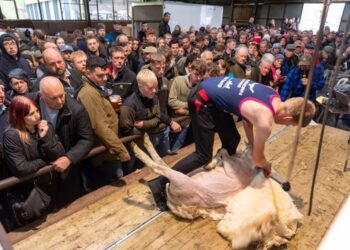
A natural capital audit of the venue of last week’s NSA North Sheep demonstrated the outstanding progress already made by the host family and revealed opportunities to cut more carbon emissions at their Greystoke Castle Farm.
For the event, Virgin Money partnered with leading natural capital specialists Trinity AgTech to carry out a whole-farm carbon audit of the Peile family’s farm.
The headline results were announced during a dedicated seminar at the event, including that Greystoke Castle Farm’s overall carbon footprint is 1,465.32 tCO2e net carbon balance, which is made up of 3,716.42 tCO2e in emissions and -2,251.10 tCO2e of sequestration.
The permanent grasslands have a positive net carbon balance of -877.32 tCO2e; the sheep enterprise has an emissions score of 1,080.04 tCO2e, which is at the lower end of the industry average; and the beef suckler enterprise has a total emissions score of 666.93 tCO2e, which would be considered a lower score.
Anna Woodley, of Trinity AgTech, said: “Greystoke Castle Farm is a great example of a productive, mixed farming system that’s clearly been built with care. The carbon footprint results reflect a thoughtful balance between commercial livestock production and well-managed permanent pasture that supports long-term resilience.
“There’s always room to go further and the data suggests some practical opportunities — like introducing herbal leys or more legumes into the pasture — if the Peile family decide to explore them.
“Running carbon and natural capital assessments on farms like Greystoke is incredibly valuable. It gives the business a clear view of where its emissions are coming from and how its natural assets like soil, water, and biodiversity are contributing to the system. More importantly, it opens up opportunities — from cutting input costs to unlocking public funding or supply chain incentives.”
Greystoke Castle Farm is a mixed livestock farm including 913ha of permanent grass and 49ha of woodland. John and Liz Peile run a mixed farm of Limousin and Simmental beef cattle, Swaledale sheep and a dairy herd.
The grazing land is a combination of upland pasture and improved grazing for all livestock. They have wood pasture/silvopasture areas in 35 fields where cattle can graze, and keep some cattle breeds that are left out on pasture all year round and others housed for longer periods. The sheep are extensively grazed.
Trinity AgTech noted that the Peiles’ data was producing results below the average for emissions in most areas of their farming operations.
Anna Woodley suggested some changes the family might explore to reduce their carbon footprint, saying: “The Peiles already employ a form of rotational grazing strategy, but implementation of further practices may be possible to improve their grazing utilisation.
“Resting periods of certain fields could be increased and for certain fields the stocking rate is high. This could be interpreted as a mob-grazing approach because most fields do have a resting period of three months during the winter.
“Sward mixes are currently all inputted as ‘mixed grass ley, species rich sward’. These could be refined further if the farm were to analyse the sward breakdowns further. For example, adding legume mixes into their sward would have a positive impact on their carbon footprint for the grasslands and further increase sequestration by increasing the soil carbon stock change by approximately 18%.
“Both organic and manufactured fertiliser is used on the pasture. If they reduced inputs, it would likely reduce their emissions related to pasture management significantly.”
Following completion of the carbon audit, Virgin Money’s head of agriculture UK, Brian Richardson, said: “Farmers like the Peiles are facing a wide range of economic pressures in producing high quality food both sustainably and profitably. At the same time, they’re being asked by consumers and supply chains to show clear progress in reducing carbon emissions.
“We were pleased when the Peile family agreed to undertake an audit with our partners at Trinity AgTech.
“Greystoke Castle Farm is a fantastic example of forward-thinking land management and I’m delighted the results have been so encouraging. I hope this work will support their journey toward a more sustainable, low-carbon future and inspire others to take similar steps.”































